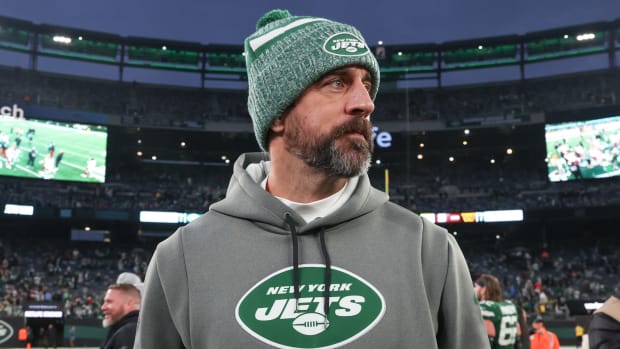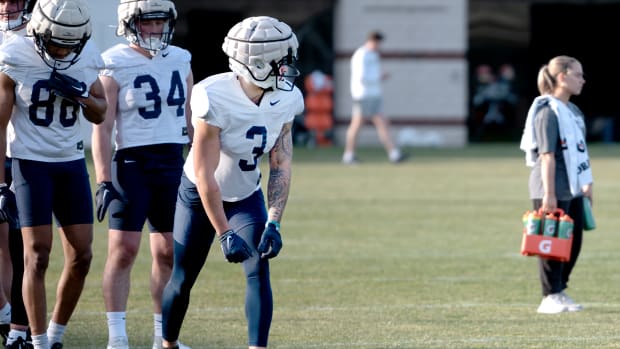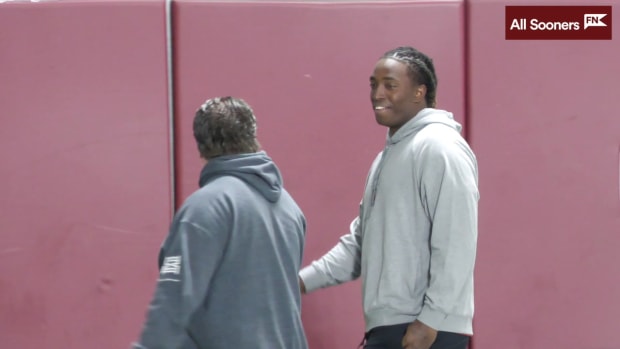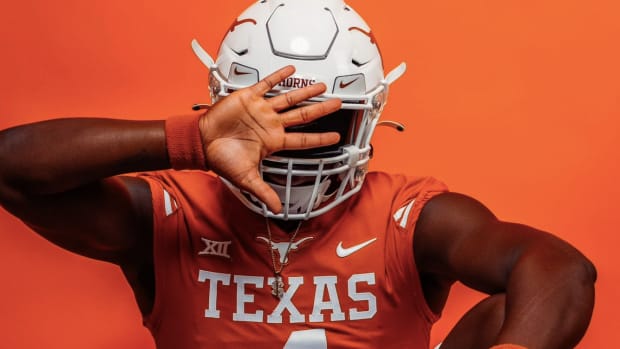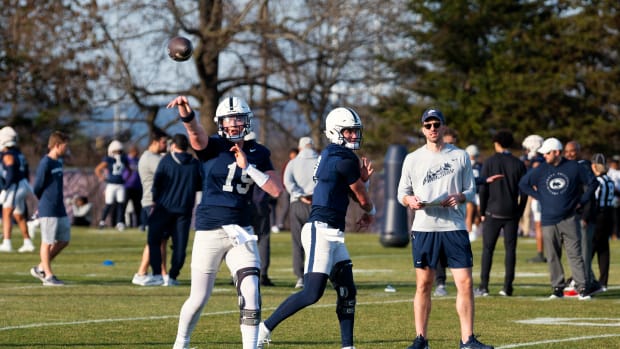Impact on LSU, Players If Odell Beckham Jr. Handed Out Real Money
He’s a distinguished alumnus of Louisiana State University and the Tigers football program. He was also born and raised in the Bayou State.
It’s safe to assume that Cleveland Browns wide receiver Odell Beckham Jr. meant no harm to LSU on Monday night at the Mercedes-Benz Superdome in New Orleans. Yet within minutes of the Tigers' defeating Clemson 45-25 in the national championship game, Beckham insisted on handing cashlike currency to nearby players. Whether he dispensed real cash or fake money—or perhaps a bit of both—is now a crucial compliance question for LSU Athletics.
Beckham Takes on NCAA Amateurism
Beckham was televised on the field handing wads of what appeared to be U.S. currency to two LSU players, junior receiver Justin Jefferson and junior defensive back Jontre Kirklin. Beckham didn’t try to hide what he was doing. Just the opposite, he wanted attention.
And he got it.
Many cheered Beckham for bluntly mocking NCAA amateurism rules. Those rules, which attempt to separate college sports from professional sports, forbid student-athletes from accepting cash and other benefits. NCAA Bylaw 12 contemplates the loss of a student-athlete’s eligibility to play if they accept cash or an equivalent award. Schools, meanwhile, are obligated to undertake reasonable steps to prevent, monitor and, if necessary, address illicit payments.
Beckham’s provocative move tapped into the values of a large segment of sports fans, journalists, public figures and other NCAA critics. They find it hypocritical that college coaches can earn millions of dollars a year and universities can build multimillion-dollar stadiums, arenas and other sports facilities when the labor—the student-athletes—are denied compensation for their unique talents as well as for their commercially marketable names, images and likenesses. The fact that elite college football and basketball players generate the very entertainment that attracts billion-dollar TV deals and lucrative apparel and merchandise contracts is essentially dismissed as irrelevant under amateurism. Players are limited to reimbursement for tuition, housing, books, cost of attendance and other narrowly defined categories of education-related expenses.
Beckham also had nothing to fear from the NCAA. He’s a 27-year-old NFL star in the middle of a five-year, $90 million contract. The NCAA can’t do anything to him.
The problem for Beckham is that while the NCAA has no jurisdiction over him, it certainly has jurisdiction over his favorite university—including for actions that Beckham takes in relationship to the Tigers football program. To that point, omissions, oversights and lack of monitoring by athletic department personnel or boosters can trigger school punishments.
Direct Deposit or Practical Joke?
On Tuesday, LSU senior associate athletic director Robert Munson seemed to downplay Beckham’s cash handouts. Munson thought Beckham was only playing a “joke.” He noted that the bills appeared to be fake. But Munson cautioned that his staff would discuss the matter with Jefferson and Kirklin and figure out exactly what occurred.
On Wednesday, LSU Athletics released a statement that suggests the cash may have been real.
“Initial information,” the statement reads, “suggested bills that were exchanged were novelty bills.” Upon further review, however, LSU Athletics now believes that real cash “may have also been given” to football players. LSU Athletics also notes that its personnel have been in contact with the NCAA and SEC “in order to rectify the situation.”
It’s not clear if LSU has interviewed Beckham. The school has no ability to compel him to cooperate. However, given Beckham’s longstanding ties to the school, it would be sensible for him to play a constructive role.
Additional evidence suggests the cash was real and that Beckham gave it to more than two players.
While appearing on Barstool Sports’ Pardon My Take on Wednesday, Tigers quarterback Joe Burrow—the presumptive No. 1 pick in the 2020 NFL draft—told host Dan Katz that Beckham handed him real money after the game. Burrow, who is a 23-year-old senior, didn’t believe it was a big deal since the handout occurred after the game had ended. By that point, Burrow stressed, he was no longer a student-athlete but instead an NFL draft prospect.
If Burrow’s retelling of events is correct, Beckham's handing real cash to other LSU players seems likely. After all, was Beckham really in possession of different bundles of real cash and fake cash, and then distinguishing which type he gave to LSU players based on their remaining NCAA eligibility? Sure, that’s theoretically possible, but sounds like a stretch.
Another relevant piece of evidence is the fact that Beckham requested, and received NCAA permission, to provide every LSU player a pair of Beats Studio 3 wireless headphones (which retail for several hundred dollars). On one hand, it’s clear that Beckham wanted to furnish a valuable benefit to LSU players. On the other, Beckham's offering advance notice to LSU (and in turn the NCAA) before carrying out a plan suggests he was mindful of amateurism consequences. Was he cautious about headphones but then reckless about cash?
Impact on LSU and Its Players
LSU’s incentive in investigating the matter is not necessarily to dispute that Beckham handed cash to football players—what’s done is done. Instead, it’s to make clear that LSU coaches and athletic compliance staff neither knew, nor had reason to know, that Beckham would engage in behavior that jeopardized LSU’s compliance with NCAA rules. The NCAA would be less likely to sanction LSU if the school genuinely didn’t know that Beckham would carry out a postgame stunt and if school officials hadn’t observed any indications that it would happen.
To that end, LSU will need to explain what steps it took to monitor Beckham, who likely qualifies as a “representative of LSU’s athletic interest” or, more colloquially, an LSU booster. The NCAA broadly defines boosters to include those who promote an athletic program and those who provide benefits to enrolled students or their families. Schools must carefully monitor boosters pursuant to NCAA Bylaw 13.02.15.
LSU will attempt to detail how it monitored Beckham while he was on the field, in the locker room and in other locations in which he interacted with LSU players. The school, remember, was on notice that Beckham wanted to provide gifts to LSU players in the form of expensive headphones. For LSU’s compliance, that fact cuts both ways: It signaled to LSU that Beckham wanted to provide items of value to football players, but it also suggested that he wished to do so in an NCAA-compliant way.
LSU also wants to communicate to the NCAA and SEC that it is taking the Beckham matter seriously. A school that, through a detailed and systematic investigation, uncovers wrongdoing and self-reports it to the NCAA is less likely to face a severe punishment. In that scenario, LSU might face a public reprimand and modest restrictions on boosters, but not much more. In contrast, a school that ignores or covers up possible wrongdoing is much more likely to attract a threatening NCAA investigation. If found in violation of rules, the school could then face severe penalties, such as loss of scholarships and a postseason ban. LSU, in other words, is taking the right steps by signaling that it is conducting a credible investigation.
Lastly, LSU is mindful of the possible adverse impact of Beckham's handing real cash to players with remaining eligibility. Burrow is headed to the NFL, perhaps to the Cincinnati Bengals with the first pick. Jefferson, meanwhile, declared his eligibility for the NFL draft on Wednesday. He is projected to be selected in the first or second round.
Kirklin is in a more problematic spot. He is not expected to declare for the draft and presumably wishes to return to LSU for his senior year. If he accepted and retained real cash from a booster, he could face an NCAA suspension. If Kirklin attempted to return the cash to Beckham (which admittedly would have been awkward and kind of tacky) or to school officials (less awkward), the NCAA would be less inclined to punish him.
Michael McCann is SI’s Legal Analyst. He is also an attorney and the Director of the Sports and Entertainment Law Institute at the University of New Hampshire Franklin Pierce School of Law.

